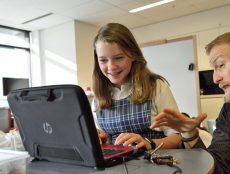
Articles
Education Technology
“Teachers Want to Teach!” Flexpoint Education Cloud on what Teachers Need from Online Learning
By Aniqah Majid
December 06, 2021
DECEMBER 6 – At the height of the pandemic, online learning was essential in keeping schools up and running on a remote basis. According to the United States Census Bureau, in 2020, nearly 93% of households with school-age children reported some form of distanced learning, with 80% of that being online. Flexpoint Education Cloud, an online learning provider, helped school districts across the US train over 14,000 educators, amounting to more than 500 hours worth of live professional development (PD).
The Florida-based company has been operating for over 20 years in providing learning materials for schools to create kindergarten to K-12 level learning programs. This is coupled with their catalog of over 180 online learning courses which can be customized to various state standards. With this background, the company has pinpointed several training topics teachers are most eager to learn, from leveraging LMS to keeping students engaged.
A 2021 Survey from Educators for Excellence found that 67% of teachers learned ways to integrate technology into their teaching and plan on carrying this on after the pandemic.
Personalized learning is a big issue that can be tackled through online tools. Teachers are looking at how best to utilize their learning management systems to create customized interactions with their students, according to Brooke Bess, the National Training Manager for Flexpoint. When training teachers in their PD sessions, Flexpoint uses a variety of visualization techniques that help educators transfer the activities they implement in a traditional brick-and-mortar classroom, to an online classroom setting. These activities are translated into the LMS, e.g. creating a digital homeroom that students can go to before logging on to their classes.
Bess goes into further detail about how LMS can be used by teachers, “we helped a group of science teachers build out a science fair project in their learning management system for students to participate in. We partnered with them to identify the assets and resources they wanted to include in the project and trained them on how to use the tools in the learning management system to create an engaging scientific inquiry experience for their students.”
Since 2018, Flexpoint has also been offering online learning courses for elementary school and pre-kindergarten teachers called Littlest Learners, which helps young students with learning online.
The Littlest Learners series contain multiple courses adapted for online learning, from their Emerging Readers course to their Littlest Mathematician course. Similar to the K-12 training sessions, teachers are taught how to implement LMS into their learning activities, and how best to plan and track the programs they deliver to their students. Also, like older students, young learners too benefit from connection and building a relationship with their teachers. This, in part, helps students become more engaged with their work.
“We show elementary teachers how to take their tried-and-true best practices from the physical classroom, and evolve them into fun and engaging activities for their students online,” Says Brooke Bess, when describing the type of training offered to kindergarten and elementary school teachers specifically. “Sometimes it looks like a “lunch bunch” so that teachers and students have more time to interact outside of lessons or teachers doing a science experiment that involves making a mess of their kitchen while their students laugh in Zoom. The engagement comes from the connections and relationships that the teachers make with their students.”
Flexpoint is also part of the Florida Virtual School (FLVS), a fully accredited statewide school district, providing tuition-free part-time and full-time online learning platforms. Students outside of Florida can also benefit from FLVS with the Global School.
The stress of the pandemic provided even more incentive for Flexpoint to extend online learning materials to hard-to-reach places. In early 2020, the company partnered with the Alaska Department of Education & Early Development (AK DEED), to create its first statewide virtual school. Alaska is home to some of the most rural school districts in the US, where teachers from small schools tend to teach across multiple subjects and grade levels.
Deborah Meyer, the Senior Director at Flexpoint, went into further detail about the importance of a virtual schooling platform for such remote learning environments in Alaska. “The COVID-19 pandemic hit, forcing school closures and requiring AK DEED to press fast forward on their plans for Alaska’s first statewide virtual school. With no time to spare, we partnered with AK DEED to launch Alaska State Virtual School in March 2020, two years ahead of schedule. We also licensed our digital curriculum with more than 180 courses and hosted intensive teacher training for more than 190 Alaskan teachers who wanted to help as many of their students as possible by teaching online during the pandemic. By partnering with AK DEED, we were able to establish a Kindergarten-12th grade virtual school to ensure equity and opportunity for all their students.”
With a virtual school, parents from hard-to-reach areas in America can enroll their children outside their designated state school, expanding their options for education.
A recent Flexpoint survey found that 75% of parents believe that online learning does help their children learn new skills which they would not otherwise learn in traditional teaching.
Meyer goes on to cement the ethos of Flexpoint, explaining how the importance of online learning and training extends past the immediate needs of the COVID-19 pandemic.
“Our goal is to be able to help even more educators deliver the right learning experience so their students can succeed – whether they are new to online learning and are looking for best practices or have experience with online teaching and want new and innovative techniques to use in the classroom.”









No Comments